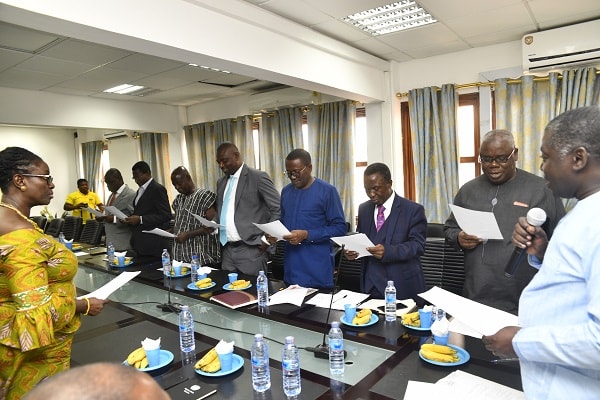The Minister of Lands and Natural Resources, Mr Kwaku Asomah-Cheremeh, has charged the management of the Ghana Geological Survey Authority (GGSA) to work towards expanding its internally generated funds (IGFs) base to wean itself off government subvention.
He urged the reconstituted board of the authority to lead the process to review upwards the rates for services the authority provided for the public and also explore other avenues to make the service financially independent.
He said generating its own funds would not only take the burden off the public purse but also enable the GGSA to attract quality human resource to fulfill its mandate.
Mr Asomah-Cheremeh made the call in a speech read on his behalf by the Deputy Minister of Lands and Natural Resources in charge of Forestry, Mr Benito Owusu-Bio, at the inauguration of the GGSA Board in Accra on Friday, September 27.
Board members
Although the GGSA Act, 2015 (Act 928) requires that an 11-member board be constituted to provide oversight for the authority, only nine members were sworn in yesterday, with the explanation that the other two would be appointed later to complete the membership.
The board is chaired by the President’s nominee and geologist with the National Disaster Management Organisation (NADMO), Mr Philip Yaw Oduro Amoako.
The other members are the Chief Director of the Lands Ministry, Professor Patrick Agbesinyale; the Chief Director of the Ministry of Energy, Mr Lawrence Apaalse; a Chief State Attorney, Mrs Dorothy Afriyie Ansah, and two lecturers at the Department of Earth Science of the University of Ghana, Prof. Frank Kwakye Nyame and Dr Jacob Mawuko Kutu.
The rest are a Principal Surface Water Resources Engineer at the Water Resources Commission (WRC), Dr Bob Alfa; the acting Chief Inspector of Mines at the Minerals Commission, Mr Richard Kofi Adjei, and the acting Director-General of the GGSA, Dr Daniel Boamah.
![]()
Mandate
The authority’s mandate includes giving advice to the state to make informed decisions on geo-scientific issues concerning mineral resources, ground water, the environment, geo-hazards and land planning.
This is done through geo-scientific research, investigations and the provision of relevant data to the government, industry and the public at large.
The minister asked the board to be diligent in ensuring that challenges confronting the GGSA were addressed to help it achieve its mandate.
“The GGSA must help carry out site or foundation investigation prior to major construction works to reduce the impact of geo-hazard and for effective land use planning; delineate potential mineralised areas for small-scale mining and continuously monitor earthquakes,” he said.
Mr Asomah-Cheremeh further urged the reconstituted board to build the capacity of the technical staff of the authority to enable them to fulfill their mandate and vision of becoming a world-class geo-scientific centre.
He also asked the members to help in diversifying the country’s mineral portfolio by exploring other minerals, instead of focusing on only gold.
![]()
Assurance
In his response, Mr Amoako gave an assurance that the board would lead the process to build the capacity of staff of the GGSA and also collaborate with key stakeholders to support the authority to deliver quality services, especially in the water and minerals sector.
He said the board would also prioritise the diversification of the mineral resources in the country.
“We are committed to doing this because the mono-mineral economy is not helping us and we will have to diversify it to ensure that the country gets maximum benefit from its mineral resources,” he added.
Mr Amoako said the board would also put in mechanisms for the proper storage of data for the benefit of the public.

